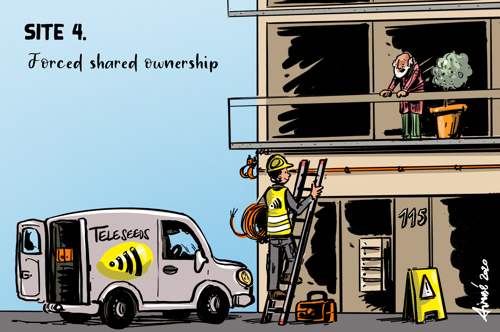- Real Estate, Renting and Co-ownership , Construction Law
- co-ownership , shared ownership , conversion works , property law
On this site, Victoria explains how to carry out conversion works within a forced co-ownership without the explicit and prior approval of the general meeting of co-owners.
1. Apartment Law and conversion works
As you could read earlier, there are no novelties to report here as the Apartment Law was only amended a few years ago and has been fully incorporated into the new Property Law.
However, we would like to take this opportunity to explain an important aspect namely the possibility of carrying out conversion works without the express and prior approval of the general meeting of co-owners.

2. Which conversion works are we talking about?
Each co-owner may make changes to the undivided property at his or her own expense, provided he or she does not distort the purpose and does not prejudice the rights of the other co-owners.
The latest amendment to the law in 2018 provides that individual co-owners as well as the recognised utility operators have the legal right, free of charge, to install, maintain or renew cables, pipes and associated facilities in or on the common parts.
This is subject to the condition that the aim is to optimise the infrastructure for the owner(s) and users of the private parts concerned in terms of energy, water or telecommunications.
Neither the individual co-owners nor the association of co-owners may be financially burdened by this.
The person who has built the infrastructure for his own account also remains the owner of the infrastructure located in the common parts.
3. Notification of the co-ownership is mandatory
Attention, before you proceed with the execution of these works, you are obliged to notify the co-owners and, in case of existence, the trustee.
They may oppose these works, but only for a legitimate interest.
The decision to carry out conversion works does not have to be approved in advance by the general meeting, which is the case for the execution of other works at the level of the common parts that do not fall under the area of application of "conversion works".
4. What exactly does this mean?
Because of this possibility, each individual co-owner has the right to pull the cables (or have them pulled).
Co-owners who wish to install an electric charging station, for example, in the individual car park - located in the common garage or on the co-grounds - can apply this option.
It will also be easier for utility operators to pull the necessary cables with a view to installing a mobile phone mast on a building.
But beware! This regulation of the conversion works does not offer the possibility of installing a charging station or mobile phone mast yourself. This right only concerns the installation of cables and pipes and not the infrastructure itself.
Don't hesitate to contact us if you have more questions about this subject or the apartment regulations (+32 (0)2 747 40 07 or via info@seeds.law). Our team of specialists is ready to help you with professional advice.
Read alsoDiscover our e-book about the new property law
In our e-book "Together on a roadtrip through the new property law" you will discover a number of important topics about the new property law.







